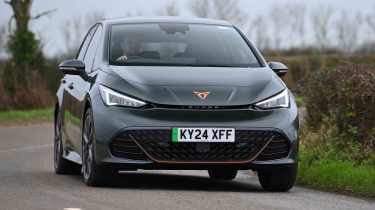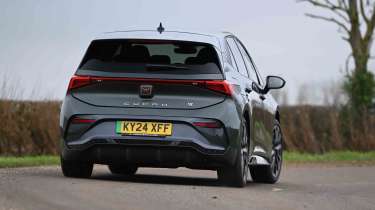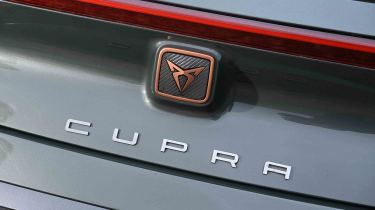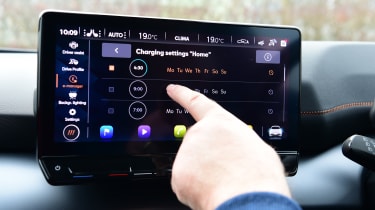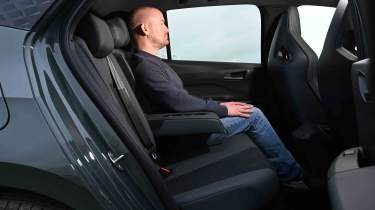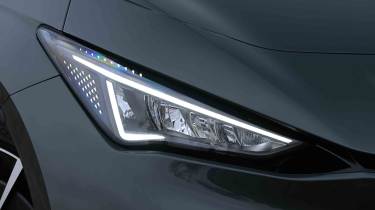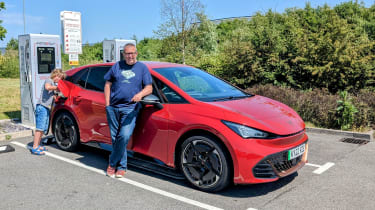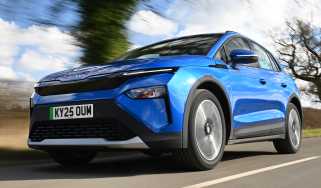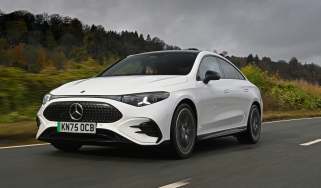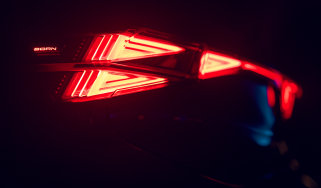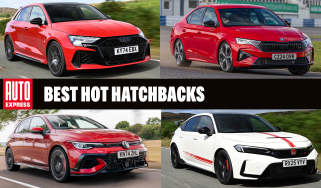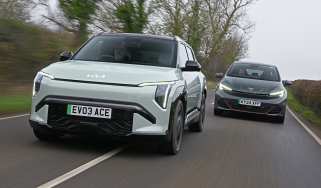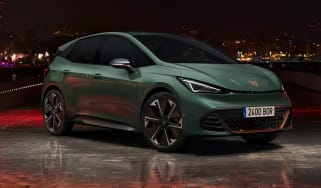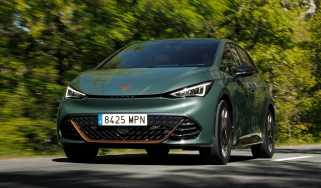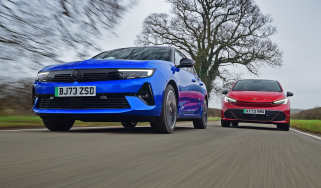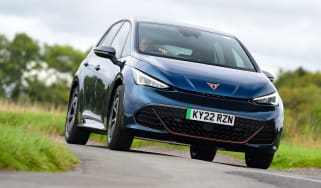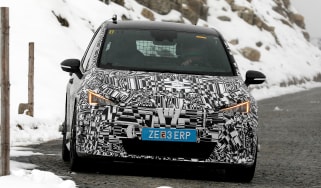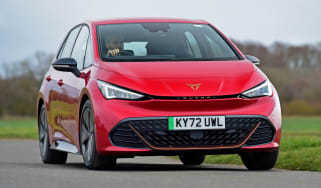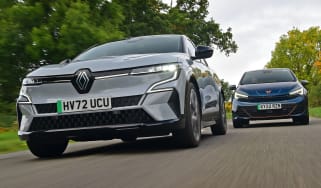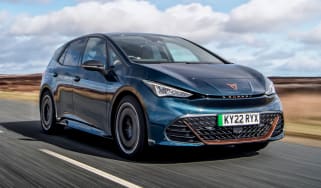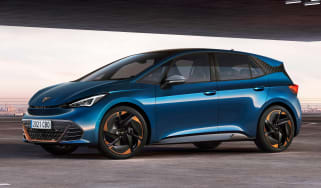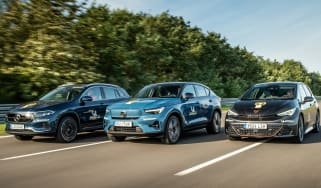Cupra Born review
Cupra’s electric hatch stands out more than its VW cousins, and the most powerful model offers proper hot hatch performance
Our opinion on the Cupra Born
It’s tricky to stand out in a class filled with so many competitive alternatives, but the Cupra Born has managed to find a smart little niche for itself. While so many of the Born’s rivals try to boost their appeal with chunky SUV design cues, the Cupra takes things in the other direction by offering a sharp and sporty look.
It rides on the Volkswagen Group’s MEB platform, which is specifically designed for EVs, and the overall proportions are determined by the fact that there is no need to package a bulky internal-combustion engine up front. The bonnet is short, which enables the wheelbase and the cabin to be stretched further towards the front. In other words, it’s the length of a regular family hatchback, but offers more interior space.
About the Cupra Born
As mentioned above, the Born sits on the MEB platform shared with other EVs such as the Volkswagen ID.3, which is also a direct rival to the Born - just not quite as sporty. The Born is presently the smallest electric car the brand offers, below the Cupra Tavascan coupe-SUV.
The Born is far more traditional than its pricier sibling in being a five-door hatchback. Think of it more like an electric Volkswagen Golf with sharper handling, and you won’t be too far from the mark.
Used - available now
This Cupra is available in four different trim levels, along with the choice of two battery capacities.
Our expert road testers have put the Cupra Born through a series of challenges since it first hit the UK’s roads. This Spanish EV managed to defeat the Vauxhall Astra Electric in our real-world twin test, thanks to its lower pricing and superior driving experience. However, it fell short of defeating the Kia EV3 in separate twin test, as the latter offered better practicality and a longer warranty.
Our former editor-at-large, John McIlory, also spent six months living with a Curpa Born V3 on a long-term test. He found the EV to be perfectly capable of taking on longer family holiday road trips, but the pitfalls of VW Group’s infotainment tech were a source of frustration at times.
Cupra Born prices and latest deals
The Cupra Born is eligible for Band 2 of the Government's Electric Car Grant (ECG), so a discount of £1,500 is applied automatically when you buy. Taking this into account, prices start from around £34,200 for the entry-level V1 model, rising all the way to £37,700 for the V3. Due to its original price being over £37,000, the range-topping VZN doesn’t qualify for the discount, and this variant starts from around £44,800.
If you're interested in getting yourself a Cupra Born, we can help you to save even more money. Configure your ideal Cupra Born through the Auto Express Buy a Car service to get top offers from local dealers, check out the latest Cupra Born leasing deals, or search for used Cupra Born models. You can even sell your existing car for a great price with Auto Express Sell My Car.
Performance & driving experience
Pros |
|
Cons |
|
Thanks to its lowered suspension, uprated anti-roll bars and tweaked steering, the VZ is the sharpest Born to drive. And for the price, it’s one of the most engaging EVs around. However, the VZ isn’t quite as much fun as a 321bhp rear-wheel-drive hatchback sounds on paper. We’d like Cupra to show a little more courage and allow the stability and traction control systems to let the driver play with the car a little more, because fundamentally, there’s a lovely balance to the chassis, which gives you the confidence to push hard.
| Model | Power | 0-62mph | Top speed |
| Born V1 59kWh | 227bhp | 6.6s | 99mph |
| Born VZ 79kWh | 322bhp | 5.6s | 124mph |
Performance, 0-60mph acceleration and top speed
Performance is great in both 227bhp versions of Born; the smaller-battery model weighs less and is therefore able to put its identical power output to better use and covers the 0-62mph sprint in 6.7 seconds – 0.4 seconds faster than the large-capacity model. The throttle response in recent models seems much more lively than in earlier Borns, so it really feels good for that performance, too.
The swifter Born VZ has 321bhp and 545Nm, lending the VZ genuine hot hatch status. The 0-62mph dash takes just 5.7 seconds, which isn’t as quick as the twin-motor versions of the Volvo EX30 and MG4 XPower, but the Cupra is far more engaging to drive than either of them.
Town driving, visibility and parking
The Born strikes a great balance between ride and handling, which helps it to stand out among a sea of models which, at best, tend to deliver one while compromising the other. Twist the column-mounted drive stalk into D, and the Born moves away in near silence. The throttle is easy to modulate and has plenty of travel to enable smooth driving around town, and the other controls are precise. The suspension has a sophistication to its damping, which means that even though it’s a little firmer than some alternatives, it rarely crashes harshly over bumps.
From the driver’s seat, the Born’s deep windscreen and small A-pillar quarterlights give the same feel of sitting at the wheel of an MPV. It does make it hard to judge where the bonnet ends, although the very short front means you can squeeze the nose into smaller spots than you initially realise.
Country road driving and handling
Ironically, the smoothest-riding Born is the hottest VZ model. Thanks to its 15-way adjustable adaptive dampers (they’re an option on V1, V2, and V3 trims), the ride can vary from a superbly cosseting level of comfort at one end to track-only firmness at the other. For the rest of the line-up, driving manners are well judged.
Regardless of which version you go for, the Born is a hefty car – the kerbweight in some models only just dips below the two-tonne mark. Yet despite this, the low centre of mass and rear-wheel-drive layout mean it’s competent along a twisty road, with a predictable balance and little body roll.
Our one criticism is the brake pedal, which has a slightly clunky transition between motor regeneration and friction braking. The pedal initially feels quite firm, but ask for more stopping power, and it then goes spongy, with extra pressure not adding much in the way of any deceleration. Whether you’re driving enthusiastically or simply trying to perform an emergency stop, it’s not the most reassuring feedback.
Motorway driving and long-distance comfort
Comfort and stability are the name of the game in the Born at motorway speeds which, combined with a potential for an excellent cruising range, makes it a very capable long-distance car. We’d like road noise to be slightly less audible; however, tyre roar is always more conspicuous in an EV when compared with a petrol or diesel car, where engine noise tends to drown it out. But even so, the Born suffers from these effects more than rivals such as the Kia EV3.
“The Born is among the best compact EVs to drive in any form, but in VZ trim it becomes a genuinely entertaining hot hatchback.” - Alex Ingram, chief reviewer.
Range, charging & running costs
Pros |
|
Cons |
|
An efficient powertrain is a big plus point with the Cupra Born, but it’s a shame that buyers needing a long range must fork out for the most expensive models.
Officially, the Cupra Born can charge at up to 185kW in VZ trim, which is among the fastest speeds of any car in its class. To achieve this, the battery needs to be at its perfect temperature, and this can be initiated easily through a simple optimiser mode in the infotainment menu. Doing so also provides an accurate estimation of potential charge speeds regardless of the battery’s current state.
With the battery in its ideal condition, we achieved 185kW up to about 30 per cent charge, tailing off to around 155kW by 50 per cent and 85kW at 80 per cent. Smaller-battery models charge slightly more slowly. However, the respective 165kW and 175kW speeds of the 59kWh and 79kWh models are still excellent.
In temperatures ranging between freezing and 10 degrees Celsius, we averaged 3.3 miles/kWh when testing the top-spec Born VZ, which translates into a real-world range of 261 miles. When we ran a Born with the older (and ever so slightly smaller) 77kWh battery on our long-term fleet, warmer temperatures lifted its overall range to beyond 300 miles.
| Model | Battery size | Range | Insurance group |
| V1 59kWh | 59kWh | 265 miles | 26 |
| V3 79kWh | 79kWh | 348 miles | 28 |
| VZ 79kWh | 79kWh | 367 miles | 34 |
Insurance groups
The entry-level Born equipped with the 59kWh battery starts at insurance group 26, with bigger-battery models and higher trim levels rising to 28. The sporty VZ model is the most expensive of the range to insure, and is in group 34.
Tax
Now that electric vehicles are liable for the luxury car tax, opting for the higher trim levels pushes the Cupra Born over the £40,000 threshold. Do this and you can expect to pay a combined £620 in VED road tax from the second to sixth year after registration.
There’s good news for company car buyers, though, as the Born benefits from the usual low Benefit-in-Kind (BiK) tax rates associated with zero-emission cars.
Depreciation
The Cupra Born does suffer its fair share of depreciation, but it’s no worse than some of its key rivals. According to our market data, this EV should retain 40 to 43 per cent of its original price after three years and 36,000 miles. This isn’t worlds apart from the Cupra’s sister car, the Volkswagen ID.3, as this manages 39 to 47 per cent.
Elsewhere, the Renault Megane E-Tech holds on to between 45 and 48 per cent, while the Vauxhall Astra Electric clings on to between 37 and 42 per cent.
Interior, design & technology
Pros |
|
Cons |
|
Copper highlights, a sporty-looking steering wheel and interesting dashboard textures give the Born a unique look. Except for some fiddly touch-sensitive sliders, the climate controls are all adjusted via the central touchscreen.
The on-screen set-up is a big improvement on the one found in earlier models, but we’d still rather have proper buttons. If you want to adjust the climate control, the choice is either looking away from the road ahead or poking blindly at sliders that provide virtually no indication as to whether they have been pressed. In other words, it’s unnecessarily irritating and distracting.
Interior and dashboard design
While there’s no hiding its VW origins, the Born’s cabin design does enough to help it stand out and, arguably, surpass the ID.3 on which it’s based. Cupra’s usual copper highlighting helps to give the dashboard a fancier feel, while a generally angular design boosts the sporty factor (at least cosmetically).
Materials and build quality
Fit and finish inside are pretty solid all round. While the Cupra is not quite as outstanding as a Peugeot E-308 or Skoda Elroq in these areas, it feels more expensive than many other competitors at this price point.
Infotainment, sat-nav and stereo
We criticised early versions of the Born’s infotainment, and rightly so – initial set-ups had one or two baffling menu structures, and we found them to be full of glitches. The latest models featuring Cupra Connect are a vast improvement, though.
The main menu layout is logical, and shortcuts make it easier to switch off the driver-warning bongs. The climate control temperature settings are a permanent fixture on screen, which makes life easier, but we’d prefer buttons.
The 5.3-inch digital driver’s display presents only the essential information to avoid unnecessary distraction, and it adjusts with the steering wheel, so it’s always positioned in just the right place for it to be viewed clearly.
“The Born VZ comes with a Sennheiser audio system which separates certain frequencies and plays them from different locations in the cabin. On some occasions, we noticed that it split the drum track between front and rear, so it sounded like someone was just lightly tapping the dash along to the song.” - Alex Ingram, chief reviewer.
Boot space & practicality
Pros |
|
Cons |
|
The Cupra Born offers enough interior space to qualify it as a family car. However, its swooping exterior design with its small rear glass area does impede on the interior’s natural light. Opting for the larger battery pack also means sacrificing the middle seat, due to the layout of this powertrain.
Dimensions and size
A short bonnet and fairly long wheelbase help deliver plenty of cabin space, given the Cupra’s relatively compact footprint. In terms of size, the Born is slightly longer, wider and taller than a Volkswagen Golf.
Dimensions comparison | |||
| Model | Cupra Born | Volkswagen ID.3 | Renault Megane E-Tech |
| Length | 4,332mm | 4,264mm | 4,200mm |
| Width | 1,809mm | 1,809mm | 1,860mm |
| Height | 1,540mm | 1,568mm | 1,505mm |
| Wheelbase | 2,770mm | 2,770mm | 2,690mm |
| Boot space | 385 litres | 385 litres | 440 litres |
Seats & passenger space
There’s plenty of adjustment for the driver’s seat and steering wheel in all versions of the Born, while the upgraded Sabelt seats in the sporty VZ model are superb. They offer excellent support when cornering, while remaining comfortable on longer trips, too.
While slightly taller alternatives, such as the Hyundai Kona Electric and BYD Dolphin offer a little more rear legroom, the Born is above average for the segment, and passengers benefit from more shapely and supportive seats than in either the Kona or Dolphin, too. Headroom is fine for six-footers, although large C-pillars make things feel a little more gloomy in the back than in some rivals.
Boot space
With a volume of 385 litres, the boot is perfectly usable. It’s a shame that the lip is fairly high, though, and the cut-outs for the angular tail-lights make for some fairly jagged edges on the door. Unlike some rivals, the Born doesn’t have a front boot, so if you need to bring a charging cable with you on a long trip, it’ll need to be packed alongside any luggage or shopping you’re carrying.
“Thanks to a high centre console, which is more or less entirely dedicated to storage, there’s plenty of space to hide various items away. This area manages to compensate for the Born having a small glovebox.” - Alex Ingram, chief reviewer.
Reliability & safety
Pros |
|
Cons |
|
Euro NCAP awarded the Born a five-star safety rating when it was first assessed in 2022, and the car held onto this score when it was retested in 2025 under much stricter criteria.
Every model in the line-up has adaptive cruise control, forward-collision warning and autonomous emergency braking, lane assist and traffic-sign recognition.
The Born didn’t appear in the most recent Driver Power best car to own results, but the Cupra brand continues to underwhelm in the best manufacturer rankings, finishing in 28th place out of 31 carmakers. This makes it the worst performer of the Volkswagen Group (Cupra’s parent brand) whose other monikers include VW, Skoda and SEAT.
| Euro NCAP safety ratings | |
| Euro NCAP safety rating | Five stars (2025) |
| Adult occupant protection | 89% |
| Child occupant protection | 87% |
| Vulnerable road user protection | 76% |
| Safety assist | 76% |
Buying and owning
The standard Born V1 is well-equipped, and you can now add the larger capacity battery to this trim level, where it was previously reserved for higher trim levels. The saving you make over opting for V2 means you can add the energy efficient heat pump (nearly £1,000) and the cargo pack (£340). The former helps to preserve the driving range in colder weather, while the latter makes the most of the available boot space and creates a bit more space for the charging cables. The only thing that V1 trim misses out on are heated front seats, but this can also be added for a rather steep £500.
Cupra Born alternatives
The Born is the mechanical sister car to the Volkswagen ID.3 hatchback, although we prefer the Cupra because of its sportier personality and slightly larger standard infotainment screen, plus it feels better resolved to drive on UK roads. The Renault Megane E-Tech is another key rival. It can offer a range of around 280 miles on a charge, so can’t match certain versions of the Cupra, but the all-electric Renault is more practical and features one of the best infotainment systems in any new car. Another option is the Kia EV3, which is more SUV-like in its design, plus it has a softer chassis and a longer range.
The MG4 EV is also surprisingly fun on a twisty road, but more importantly for some buyers, it costs several thousand pounds less than the Cupra – an entry-level MG4 starts at less than £27,500. Even the top-spec MG4 XPower is only around £37,000, although it’s not as fun or as engaging to drive as a Cupra VZ.
Perhaps the biggest challenger for the Cupra Born is the Skoda Elroq. It too uses the MEB platform, but it’s bigger in every dimension and is a much more grown up car. It undercuts the Born on price and is better equipped. The Skoda isn’t as quick or as good to drive, but it isn’t that far behind. All in, it’s a better overall package.
Key updates of the Cupra Born review
- 11 December 2025: added details of Euro NCAP’s 2025 safety test, as well as impressions from our recent long-term and twin tests.
Cupra Born 77kWh V3 long-term test
Former deputy editor, John Mcllroy, ran a Cupra Born for six months in 2023 and covered a little over 5,000 miles in it. He completed mostly urban journeys, but did endeavour to take it on a long family holiday and a few extended day trips, where John found the range to be perfectly usable, leaving him in no doubt that the 77kWh battery pack was more than enough for family life.
What was more frustrating during his time with the car was the scheduled charging function that didn’t work. This is an important feature for any EV driver on an electric-car-specific home electricity tariff to take advantage of cheaper rates, but John had to manually do this with an app on his phone rather than rely on what he’d programmed into the car touchscreen. You can read the full long term test here...
Frequently Asked Questions
Unlike other marques in the VW Group, Cupra’s new-car warranty lasts for five years or 90,000 miles, whichever comes sooner. In addition, the warranty is transferable to subsequent owners. The Born’s battery is covered for eight years or 100,000 miles and will be replaced if it drops below 70 per cent capacity.
Deals on the Born and alternatives




